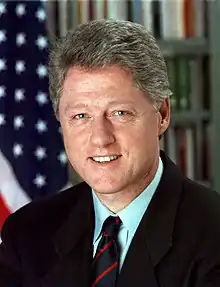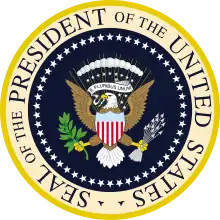1998 State of the Union Address
The 1998 State of the Union Address was given by the 42nd President of the United States, Bill Clinton, on Tuesday, January 27, 1998, at 9 p.m. EST, in the chamber of the United States House of Representatives to the 105th United States Congress. It was Clinton's fifth State of the Union Address and his sixth speech to a joint session of the United States Congress. Presiding over this joint session was the House Speaker, Newt Gingrich, accompanied by Al Gore, the Vice President of the United States, in his capacity as President of the Senate.
Full video of the speech as published by the White House | |
| Date | January 27, 1998 |
|---|---|
| Time | 9:00 p.m. EST |
| Duration | 1 hour, 16 minutes |
| Venue | House Chamber, United States Capitol |
| Location | Washington, D.C. |
| Coordinates | 38°53′23″N 77°00′32″W |
| Type | State of the Union Address |
| Participants | Bill Clinton |
President Clinton discussed the federal budget, taxes and focused on the budget deficit, then at $10 billion. The president also discussed education, foreign relations, science funding, development, space travel and the Internet.
In the speech, the president acknowledged the deaths of Representatives Walter Capps and Sonny Bono.
The speech lasted 1:16:43 and consisted of 7,303 words.[1]
The Republican Party response was delivered by Senator Trent Lott of Mississippi.[2]
William Daley, the Secretary of Commerce, served as the designated survivor.
References
External links
| Wikimedia Commons has media related to 1998 State of the Union Address. |
| Wikisource has original text related to this article: |
- (full transcript), The American Presidency Project, UC Santa Barbara
- Coverage by the NewsHour with Jim Lehrer
- Entire 1998 State of the Union address (video) at C-SPAN
- Entire 1998 State of the Union Response (video) at C-SPAN
- Entire 1998 State of the Union Response (transcript)
- (full video and audio), Miller Center of Public Affairs, University of Virginia.
| Preceded by 1997 State of the Union Address |
State of the Union addresses 1998 |
Succeeded by 1999 State of the Union Address |

